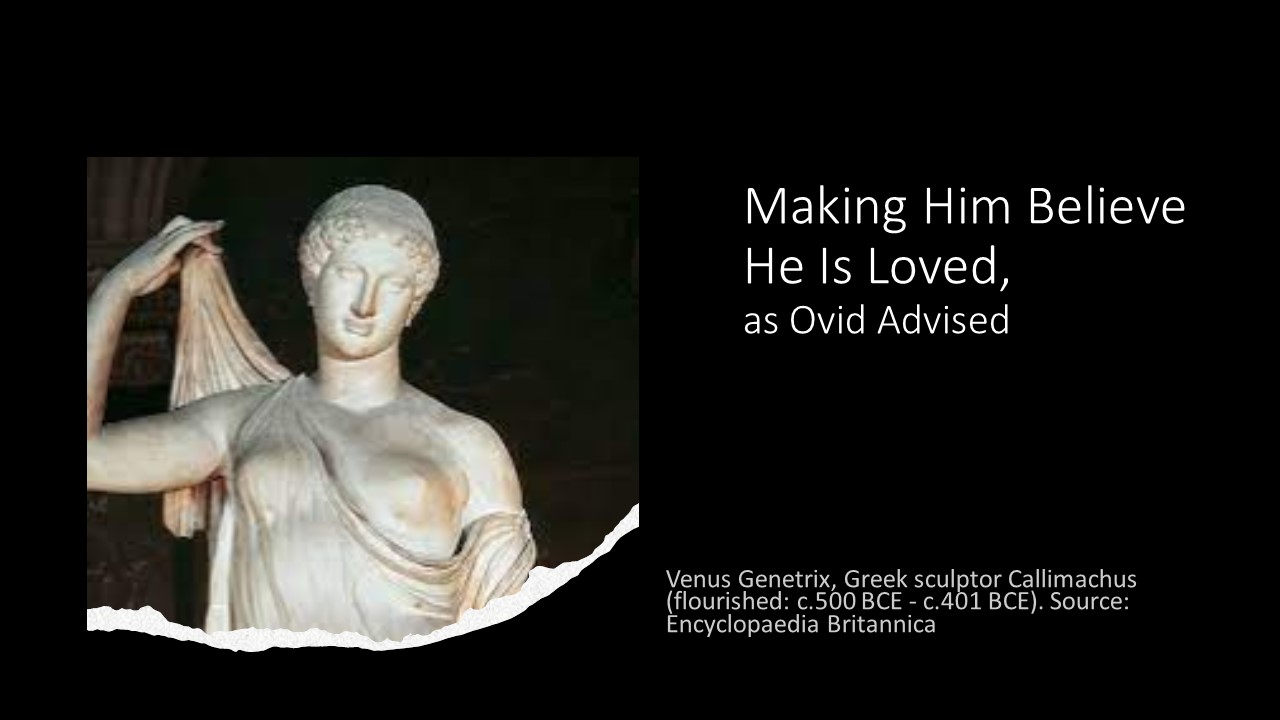Here I quote step 2 of how to “Make Him Believe He Is Loved,” as Ovid suggested women learn the art of love with a man.
Many Western scholars are familiar with the poems of Ovid, the ancient Roman poet who lived from 43 BCE to 17 CE. He rose to prominence as the author of three books titled “Ars Amatoria” (The Art of Love). The poems in the books offered men and women advice on how to make love.
Ovid’s Ars Amatoria fascinatingly depicted the hedonistic and refined lifestyles of the Roman aristocracy at the time. The books instructed men on the art of love, including how to find, win, and seduce women, as well as maintain their sexual relationships. The books also instructed women in the art of love, including how to attract, be lovable, and maintain relationships with men.
Is Ovid’s Poetic Advice on “The Art of Love” Still Applicable in Modern Times?
I believe Ovid’s advice is still applicable to modern society. This is the reason why his poems have been translated and published numerous times over the last few centuries.
We must acknowledge that the Romans lived in a different cultural era and way of life than us. However, the art of love has withstood the test of time. Ovid’s poetry can teach educated men and women about love in a fun and practical way. As a result, for those interested in learning more about how ancient Romans lived and loved, I’ve included excerpts from his books on this website. While some of Ovid’s love advice and recommendations may appear cynical, ironic, or manipulative, others may reveal kernels of true wisdom.
His poetry collection “Ars Amatoria” includes practical advice for modern men and women on how to find, attract, and keep a love partner. On the one hand, in his first two books of poetry, Ovid instructs men on how to approach, court, and seduce women in a relationship. The third book, on the other hand, teaches women how to be attractive and appealing in order to entice men to fall in love with them and maintain those relationships.
In previous post, I quoted the first thing, which Ovid advised women to do to “Make Him Believe He’s Loved.”
Here’s another verse for girls and women from Book III of Ovid’s “Ars Amatoria,” in which Ovid advise how to make him believe he is loved.
Dear readers, please note that these books of poems speak about how to make love with the art of manners, manipulation, seduction, and intrigue. In the verse below on how to “Make Him Believe He’s Loved” which is quoted here, you may notice Ovid’s cynical and manipulative style. Yet, I believe it has some truth.
Here I Continue the Further Advice Ovid Gives Women to “Make Him Believe He’s Loved”
“The many kinds of leaves and grass-heads tremble
at the touch of light winds and refreshing breezes.
The quiet pleased Cephalus: leaving men and dogs behind,
the weary youth often settled on this spot,
‘Come, fickle breeze (Aura), who cools my heat’
he used to sing, ‘be welcome to my breast.’
Some officious person, evilly remembering what he’d heard,
brought it to the wife’s fearful hearing:
Procris, as she took the name Aura to be some rival,
fainted, and was suddenly dumb with grief:
She grew pale, as the leaves of choice vine-stalks
grow pale, wounded by an early winter,
or ripe quinces arching on their branches,
or cornelian cherries not yet fit for us to eat.
As her breath returned, she tore the thin clothing from her breast,
and scratched at her innocent cheeks with her nails:
Then she fled quickly, frenzied, down the ways,
hair flowing, like a Maenad roused by the thyrsus.
As she came near, she left her companions in the valley,
bravely herself entered the grove, in secret, on silent feet.
What was in your mind, when you hid there so foolishly,
Procris? What ardour, in your terrified heart?
Did you think she’d come soon, Aura, whoever she was,
and her infamy be visible to your eyes.
Now regretting that you came (not wishing to surprise them) now pleased: doubting love twists at your heart.”
Kline, A. S. (2001). Translation of Ovid’s Ars Amatoria: The Art of Love.
